The Wisdom Buddha Protector of Je Tsongkhapa's Tradition
Spiritual Lineage
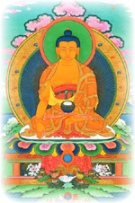
Buddha
Shakyamuni
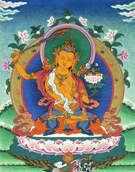
Buddha
Manjushri

Je Tsongkhapa
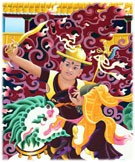 Wisdom Buddha
Wisdom Buddha
Dorje Shugden
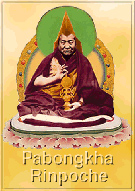
Pabongkha Rinpoche
(1878-1941)
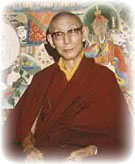
Trijang Rinpoche
(1901-1981)
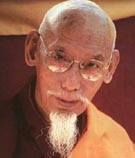
Song Rinpoche
(1904-1984)
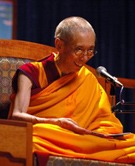
Geshe Kelsang Gyatso
(born 1931)
What would Thomas Jefferson think of the 14th Dalai Lama?
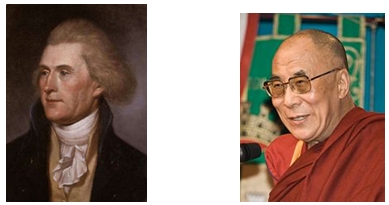
In 1779 Thomas Jefferson laid out his vision for religious freedom in a bill which would later be passed by the assembly of the state of Virginia in 1786. Two excerpts from this remarkable exposition will serve to highlight a line of reasoning that seems particularly prescient in light of recent events within the Tibetan Buddhist community (as will be argued later). In them, Jefferson proclaims:
"that therefore the proscribing any citizen as unworthy the public confidence by laying upon him an incapacity of being called to offices of trust and emolument, unless he profess or renounce this or that religious opinion, is depriving him injuriously of those privileges and advantages to which, in common with his fellow citizens, he has a natural right"
"that it tends also to corrupt the principles of that very religion it is meant to encourage, by bribing, with a monopoly of worldly honours and emoluments, those who will externally profess and conform to it"
In these passages, Jefferson clearly identifies a particular danger inherent in any effort of merging the religious and political spheres. First, such an unhealthy marriage can easily lead to a corrosion of the natural and civil rights of citizens. But even beyond this detriment to civil liberties and political institutions, Jefferson argues that an encroachment of politics on religion has the added effect of corrupting the same religious traditions it was designed to promote. This latter point deserves closer inspection: What Jefferson realized was that political interference or coercion in religious matters must invariably lead to a hollowing out of the essence of religious practice. The reasoning is perhaps best revealed in the context of Buddhist practice.
Within Buddhism, spiritual practice is clearly understood as an internal path with the aim of transforming inner states, states of mind. Spiritual progress can only occur via an inner transformation. By definition, however, an inner transformation cannot be forced upon an individual by an external agent. Instead, it must originate from a sincere intension and motivation on the part of the practitioner. This observation does not deny or diminish the essential role played by the spiritual guide in the progress of a sincere student. In fact, reliance upon a spiritual guide - a central tenant within all Buddhist traditions - is predicated upon a prior unencumbered determination on the part of the student in regards to the qualifications of the spiritual guide.
Now let is ask what happens when political concerns impinge on the spiritual or religious realm? We can appreciate that such an intrusion has the effect of essentially discouraging the pursuit of inner paths and encouraging the pursuit of worldly concerns under the guise of religion. In the words of Jefferson, to "externally profess and conform to" religious doctrine is rewarded at the expense of a genuine internal contemplation and examination. A pursuit of an external path or agenda, of course, runs counter to the very definition of spiritual practice within Buddhism. Thus, a certain lack of authenticity, a "phoniness" if you will, then creeps into one's individual practice. When this happens collectively within a community of practitioners, it can bring about a very real degeneration of an entire spiritual tradition.
In essence, Jefferson predicted that there was a logical chain starting with the mingling of politics and religion and ending with the degeneration of the religious tradition thus exposed to political influence. Let us examine whether this hypothesis has held up to empirical evidence. Many historical references from around the globe could serve as supporting evidence, but let us again narrow the discussion to Tibetan Buddhism.
One striking development in the recent history of Tibetan Buddhism is the extent to which the Dalai Lama has gained spiritual authority on top of his historical role as the political leader of Tibet. In the absence of a credible Panchen Lama, the current Dalai Lama has quite openly taken on the roles of both spiritual and political leader. If we believe Thomas Jefferson, this consolidation of roles should sound alarm bells. Nevertheless, much of the West has given the Dalai Lama the benefit of the doubt. In effect, western sentiment has been inclined to exempt the Tibetan situation from Jefferson's dictum. Two main "justifications" for the uncritical and even admiring reaction in the west towards this concentration of religious and political power in the hands of one person can be delineated: (1) Such a concentration is practically necessary in response to the aggressive occupation of Tibet by the Chinese government, and (2) the Dalai Lama is incorruptible by virtue of his spiritual attainments.
In order to judge the reliability of these contentions, let us examine the recent record of the Dalai Lama's stewardship. One action which has received substantial media attention concerns his decision to ban the worship and practice of Dorje Shugden. The main justification for this sweeping dismissal of an ancient and widespread practice within the Gelug lineage (going back 400 years) was to a great extent built upon the uttering of an oracle. The oracle asserted that Dorje Shugden was somehow interfering with the cause of Tibetan political independence. The other reason cited was an alleged shortening of the Dalai Lama's life span due to this practice.
As a result of this official ban imposed by the Dalai Lama on the Tibetan exile community and beyond, many sincere practitioners following an inner path given to them by their spiritual guides were forced to renounce this practice under threat of political reprisals. It is now well documented that those who have refused to give in to the pressure of abandoning the Shugden practice have been subjected to increasingly severe harassment by forces aligned with or acting on behalf of the Dalai Lama. In what amounts to acts of religious persecution, whole families have been systematically identified, publicly humiliated, and formally ostracized within the Dharamsala exile community. In some cases, practitioners have even reported death threats issued against them and their families in leaflets and local newspapers.
Let us then return to the standard justifications for the Dalai Lama's actions voiced in much of the western media. (1) It is clear that instead of helping the Tibetan cause against Chinese aggression, the Dalai Lama's consolidation of political and religious authority has (a) manifestly undermined civility and harmony within the Tibetan exile community and (b) disrupted the practice of many sincere followers, destroying their faith and wreaking havoc with their spiritual lives. In short, the Tibetan cause has been severely weakened. What the Chinese so far were unable to do externally, the Tibetans under guidance from the Dalai Lama seem to be doing from within. The one thing most worthy of defense against outside interference - the purity and vitality of the Tibetan Buddhist traditions - is now under siege from within. (2) The close reliance by the Dalai Lama on oracles, the great concern with his own life span, and above all his autocratic political leadership do not inspire confidence in superior spiritual attainments. The willingness to suppress free debate on this issue and to enforce religious doctrine by political means also reveals an essential insecurity. It seems that the Dalai Lama places little trust in the proposition
"that truth is great and will prevail if left to herself; that she is the proper and sufficient antagonist to error, and has nothing to fear from the conflict unless by human interposition disarmed of her natural weapons, free argument and debate" (Jefferson)
This turn of events, of course, would have come as no surprise to Thomas Jefferson, who long ago warned that the mixing of politics and religion was bound to corrupt both. And so it has played out again in the Tibetan exile of northern India. The banning of a cherished religious practice for manifestly political reasons symbolizes all that it wrong with the temptation of worldly rulers to overreach and dictate religious doctrine. It has lead to a degeneration of political civility. It has also lead to a degeneration of religious practice. When the Dalai Lama was recently asked by a reporter if all of the previous Tibetan Buddhists masters, including his own teacher Kyabje Trijang Rinpoche, were wrong about Dorje Shugden, he replied simply and without hesitation: "wrong, yes, wrong". These three words speak volumes about the current state of religious affairs in Dharamsala. They contain an explicit rejection of the qualifications of his own spiritual guides and, by direct extension, an attack on the continuity and purity of the Gelug lineage.
Dr Lars English, Ph.D.
Dickinson College Carlisle, PA 17013
Political Leader
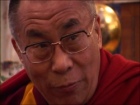 Dalai Lama
Dalai Lama
The Hypocrisy
Follow the story of the Dalai Lama's 30-year political campaign to destroy a centuries-old spiritual tradition taught to him by his own Spiritual Guide, and the efforts of those he's hurting to stop him:
Brief summary
- What is happening
- What is the Western Shugden Society (WSS)?
- Detailed reports of discrimination from inside India and elsewhere
The Dalai Lama's position
- A Great Deception
- Praise to Wisdom Buddha Dorje Shugden by the Dalai Lama
- In the Dalai Lama's words
Why is this happening?
- Why is this religious suppression taking place?
- Are the Dalai Lama's reasons valid?
Efforts to restore religious freedom
- Geshe Kelsang's open letter
- The ban is illegal and unconstitutional
- Press reports and videos
- Dorje Shugden Devotee's Charitable and Religious Society
- Dalai Lama sued for repressing religious freedom
- A conflict with a solution
- Announcement from Serpom Norling Monastery
Analysis of situation
- Sectarianism
- Can the Dalai Lama ever make a mistake?
- Is the Dalai Lama the only spiritual leader in Tibetan Buddhism?
- Theocracy or democracy?
- Spirit worship or authentic Buddhist practice?
- Freedom of worship
- The Dalai Lama's justifications
- Analysis by Dalai Lama's translator (PDF)
- What would Thomas Jefferson think of the 14th Dalai Lama?
- Book Reviews
- Videos
Evidence and first-hand accounts
- Chronological background
- Discord in exile documentary
- Political motivations for the ban
- Summary to date from Tibetan exiles
- Other
Ongoing persecution 2008-2010
- Recent vote sticks and call for help
- Forced signature and ID card campaign
- Persecution of monks at Sera Monasteries
- Public humiliation and explusion of monks
- Letter to Indian Prime Minister regarding abuses
- Letters from Dorje Shugden Devotees
- Urgent appeal from Sera Monasteries
- Support from Indian police
- Western Shugden Society letter to Sera monasteries
- Western Shugden Society letter to TGIE
- Heartfelt request from monks in Mundgod
- More discrimination planned around the world
- Letter from an FPMT monk
- Other
- What you can do